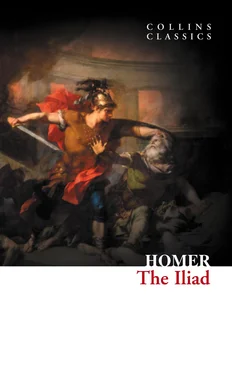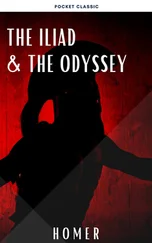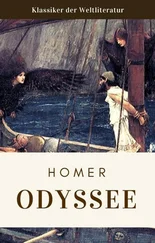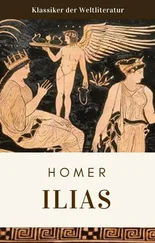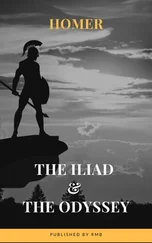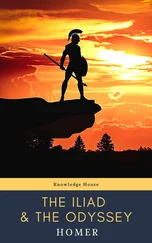The prince replies: “Ah cease, divinely fair,
Nor add reproaches to the wounds I bear;
This day the foe prevail’d by Pallas’ power:
We yet may vanquish in a happier hour:
There want not gods to favour us above;
But let the business of our life be love:
These softer moments let delights employ,
And kind embraces snatch the hasty joy.
Not thus I loved thee, when from Sparta’s shore
My forced, my willing heavenly prize I bore,
When first entranced in Cranae’s isle I lay,
Mix’d with thy soul, and all dissolved away!”
Thus having spoke, the enamour’d Phrygian boy
Rush’d to the bed, impatient for the joy.
Him Helen follow’d slow with bashful charms,
And clasp’d the blooming hero in her arms.
While these to love’s delicious rapture yield,
The stern Atrides rages round the field:
So some fell lion whom the woods obey,
Roars through the desert, and demands his prey.
Paris he seeks, impatient to destroy,
But seeks in vain along the troops of Troy;
Even those had yielded to a foe so brave
The recreant warrior, hateful as the grave.
Then speaking thus, the king of kings arose,
“Ye Trojans, Dardans, all our generous foes!
Hear and attest! from Heaven with conquest crown’d,
Our brother’s arms the just success have found:
Be therefore now the Spartan wealth restor’d,
Let Argive Helen own her lawful lord;
The appointed fine let Ilion justly pay,
And age to age record this signal day.”
He ceased; his army’s loud applauses rise,
And the long shout runs echoing through the skies.
Argument
The Breach of The Truce,
and The First Battle
The gods deliberate in council concerning the Trojan war: they agree upon the continuation of it, and Jupiter sends down Minerva to break the truce. She persuades Pandarus to aim an arrow at Menelaus, who is wounded, but cured by Machaon. In the meantime some of the Trojan troops attack the Greeks. Agamemnon is distinguished in all the parts of a good general; he reviews the troops, and exhorts the leaders, some by praises and others by reproof. Nestor is particularly celebrated for his military discipline. The battle joins, and great numbers are slain on both sides.
The same day continues through this as through the last book (as it does also through the two following, and almost to the end of the seventh book). The scene is wholly in the field before Troy.
And now Olympus’ shining gates unfold;
The gods, with Jove, assume their thrones of gold:
Immortal Hebe, fresh with bloom divine,
The golden goblet crowns with purple wine:
While the full bowls flow round, the powers employ
Their careful eyes on long-contended Troy.
When Jove, disposed to tempt Saturnia’s spleen,
Thus waked the fury of his partial queen,
“Two powers divine the son of Atreus aid,
Imperial Juno, and the martial maid;
But high in heaven they sit, and gaze from far,
The tame spectators of his deeds of war.
Not thus fair Venus helps her favour’d knight,
The queen of pleasures shares the toils of fight,
Each danger wards, and constant in her care,
Saves in the moment of the last despair.
Her act has rescued Paris’ forfeit life,
Though great Atrides gain’d the glorious strife.
Then say, ye powers! what signal issue waits
To crown this deed, and finish all the fates!
Shall Heaven by peace the bleeding kingdoms spare,
Or rouse the furies, and awake the war?
Yet, would the gods for human good provide,
Atrides soon might gain his beauteous bride,
Still Priam’s walls in peaceful honours grow,
And through his gates the crowding nations flow.”
Thus while he spoke, the queen of heaven, enraged,
And queen of war, in close consult engaged:
Apart they sit, their deep designs employ,
And meditate the future woes of Troy.
Though secret anger swell’d Minerva’s breast,
The prudent goddess yet her wrath suppress’d;
But Juno, impotent of passion, broke
Her sullen silence, and with fury spoke:
“Shall then, O tyrant of the ethereal reign!
My schemes, my labours, and my hopes be vain?
Have I, for this, shook Ilion with alarms,
Assembled nations, set two worlds in arms?
To spread the war, I flew from shore to shore;
The immortal coursers scarce the labour bore.
At length ripe vengeance o’er their heads impends,
But Jove himself the faithless race defends.
Loth as thou art to punish lawless lust,
Not all the gods are partial and unjust.”
The sire whose thunder shakes the cloudy skies,
Sighs from his inmost soul, and thus replies:
“Oh lasting rancour! oh insatiate hate
To Phrygia’s monarch, and the Phrygian state!
What high offence has fired the wife of Jove?
Can wretched mortals harm the powers above,
That Troy, and Troy’s whole race thou wouldst confound,
And yon fair structures level with the ground!
Haste, leave the skies, fulfil thy stern desire,
Burst all her gates, and wrap her walls in fire!
Let Priam bleed! if yet you thirst for more,
Bleed all his sons, and Ilion float with gore:
To boundless vengeance the wide realm be given,
Till vast destruction glut the queen of heaven!
So let it be, and Jove his peace enjoy,
When heaven no longer hears the name of Troy.
But should this arm prepare to wreak our hate
On thy loved realms, whose guilt demands their fate;
Presume not thou the lifted bolt to stay,
Remember Troy, and give the vengeance way.
For know, of all the numerous towns that rise
Beneath the rolling sun and starry skies,
Which gods have raised, or earth-born men enjoy,
None stands so dear to Jove as sacred Troy.
No mortals merit more distinguish’d grace
Than godlike Priam, or than Priam’s race.
Still to our name their hecatombs expire,
And altars blaze with unextinguish’d fire.”
At this the goddess rolled her radiant eyes,
Then on the Thunderer fix’d them, and replies:
“Three towns are Juno’s on the Grecian plains,
More dear than all the extended earth contains,
Mycenae, Argos, and the Spartan wall;
These thou mayst raze, nor I forbid their fall:
’Tis not in me the vengeance to remove;
The crime’s sufficient that they share my love.
Of power superior why should I complain?
Resent I may, but must resent in vain.
Yet some distinction Juno might require,
Sprung with thyself from one celestial sire,
A goddess born, to share the realms above,
And styled the consort of the thundering Jove;
Nor thou a wife and sister’s right deny;
Let both consent, and both by terms comply;
So shall the gods our joint decrees obey,
And heaven shall act as we direct the way.
See ready Pallas waits thy high commands
To raise in arms the Greek and Phrygian bands;
Their sudden friendship by her arts may cease,
And the proud Trojans first infringe the peace.”
The sire of men and monarch of the sky
The advice approved, and bade Minerva fly,
Dissolve the league, and all her arts employ
To make the breach the faithless act of Troy.
Fired with the charge, she headlong urged her flight,
And shot like lightning from Olympus’ height.
As the red comet, from Saturnius sent
To fright the nations with a dire portent,
(A fatal sign to armies on the plain,
Or trembling sailors on the wintry main,)
With sweeping glories glides along in air,
And shakes the sparkles from its blazing hair:
Читать дальше
